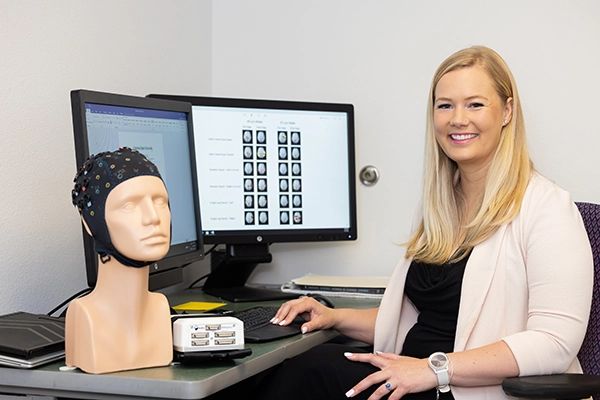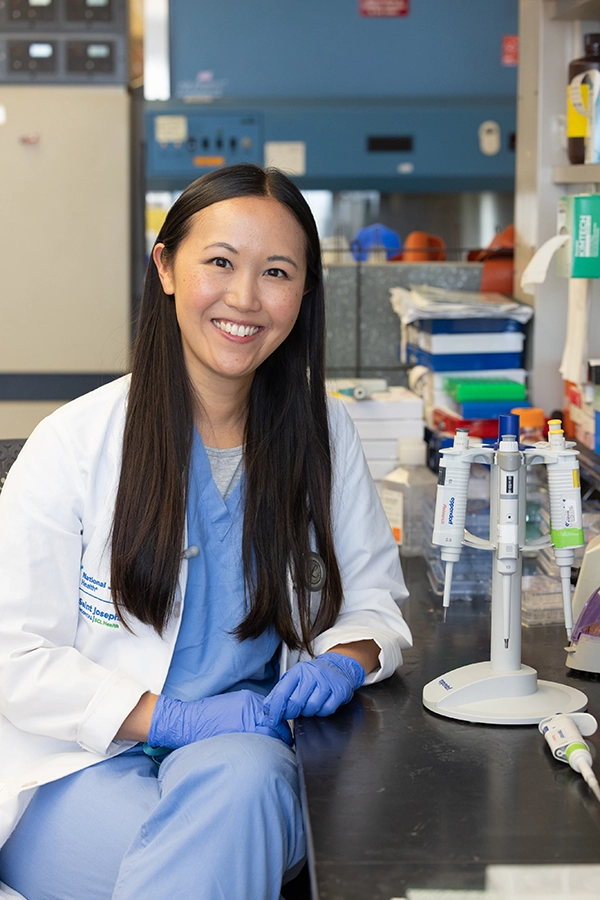Editor’s Note: In partnership with the Colorado BioScience Association, the Boettcher Foundation annually announces a cohort of Boettcher Investigators as part of the Foundation’s Webb-Waring Biomedical Research Awards. These early career researchers are leading important work in the biomedical research field at Colorado’s top research universities, institutions, and hospitals. We look forward to profiling the 2023 Investigators in October.
The Boettcher Foundation’s Webb-Waring Biomedical Research Awards Program turns 12 in 2022.
The prestigious award supports promising, early-career scientific researchers, allowing them to advance their independent research in Colorado and compete for major federal and private awards. Each Boettcher Investigator receives a $235,000 grant to support up to three years of biomedical research.
As the Webb-Waring awards embarks on its second decade of grantmaking, more female researchers are applying for the program and receiving grants. Since 2020, 50% of the investigators have been women, compared to 35% during the program’s first nine years. This year, four of the eight recipients are women.
“More women are entering STEM fields. It’s exciting to see them advance in their careers, especially securing funding that supports their promising work and growth as leaders in our ecosystem,” said Elyse Blazevich, President and CEO of Colorado BioScience Association. “Their inspiring stories highlight the importance of mentorship and community building to break down barriers and achieve more.”
Disparities
Workforce disparities and systemic career impediments are nothing new to women across sectors and industries. Women in the biomedical sciences can face complex personal and professional barriers.
Women make up nearly half of the American workforce, yet they remain underrepresented in science, technology, engineering, and math (STEM) fields. According to the U.S. Census Bureau, women comprised 27% of the STEM labor pool in 2019, while men made up 73% of all STEM workers. In Colorado, women account for 29% of the STEM workforce.
For many women in bioscience, the question of parenthood spotlights the daily inequities. Timing pregnancies based on academic or funding cycles, feeling pressure to return to work soon after having children, and deciding that a career in science is incompatible with having a family are common themes.
In healthcare fields, women are twice as likely as men to cite parenthood and increased home responsibilities as reasons for missing out on promotion opportunities, according to McKinsey and Company. While these themes are well known, stories and strategies of women facing them head on are less wildly known. 2022 Boettcher Investigator Jessica W. Hui-Beckman, M.D. recounted her story of finishing a research grant on deadline while being induced to deliver her first child.
Hui-Beckman researches the role of temperature on the atopic march. Considering the growing effects of climate change, she is especially interested in investigating the role that environmental factors, especially temperature, have on the patterns of clinical progression of allergic sensitization.
“Even though I work with a really supportive team, I still felt like it was my duty to give 100% to what I needed to finish at work while I was in labor,” she said.
Hui-Beckman noted that as she navigates her career as a new mom, it can be easy to feel isolated. A major factor in the loneliness is the dearth of examples of people striking the right balance between their careers and the other elements in their lives.
“Being a woman in the biosciences means feeling like you have to prove yourself in a male-dominated sphere, when that absolutely shouldn’t be the case,” she said.
Elevating role models, promoting diversity in leadership of private and public entities throughout the industry, and championing mentorship by women advanced in their careers and by peers, are important components in addressing these disparate experiences.
As a child, Hui-Beckman admired her pediatrician. She watched as her mom and sister pursued successful careers in bioscience. Family friends and colleagues were there for her to follow. That’s why she embraces the notion of becoming a role model for other young girls interested in STEM or research.
“I would love to become a source of encouragement for others by speaking about the vulnerability of the human condition; by embracing being a mom and a working professional,” she said.
Shanlee Davis, M.D., Ph.D., who studies pathophysiology of cardiometabolic dysfunction in Klinefelter Syndrome, says the experience of seeing other women make an impact in the sciences was the catalyst for her career choice.
“When you are figuring out what you want to do with your life and where you want to go, it is almost impossible to imagine what that would look like without looking at someone who is already in that role,” she said, while describing her early years as a volunteer research assistant.
Davis’s research program studies the role that fatty acid metabolism and mitochondrial oxidation play in the clinical manifestation and health consequences of the sex chromosome aneuploidy, Klinefelter Syndrome. Based on the findings, she will investigate the use of a potential new therapy that targets the peroxisome proliferator-activated receptor alpha (PPAR-α) metabolic pathway.
“You take parts from each of them,” said Jaclyn Stephens, Ph.D., OTR/L, when discussing how she has benefited from role models in her career thus far.
Stephens researches the potential role of yoga-based interventions on improvements in balance, autonomic nervous system function, intrinsic functional connectivity, task-dependent neural activation, and other brain function changes in patients with chronic brain injury.
“I am passionate about helping people return to who they are and see them re-engage in the communities and the activities they care about.”
Mentorship
Diverse mentorship has also been key in these Boettcher Investigator’s journeys. From mentors far advanced in their careers to peer mentors, a diverse set of colleagues is an important support mechanism to address systemic disparities faced by women in bioscience.
A key early role model for Hui-Beckman developed into a strong mentor for her as well. “She really took me under her wing, and taught me about lab experiments, let me mess up, and let me come up with questions and answer them. To this day she is still someone who I would chat with from time to time just to update her on my career of run ideas by her.”
“I have found that having a Women in Medicine peer mentorship group has been very powerful,” said Davis. “We meet periodically, get each other’s advice, and hear our diverse experiences in designing and implementing research, seeking grants, and connecting with our mentors/ees.”
Stephens also uses the support of a peer network of all-female, early-career occupational therapy scientists from across the country.
“We talk about all of the challenges of research, but we also talk about family and finances and children and COVID, and it is so good to have a group of women who have these shared experiences and who understand these demands and pressures.”
Leadership
It can often be the case that in public and private bioscience organizations, there is a lack of female representation in leadership positions.

According to a 2021 Biotechnology Innovation Organization (BIO) report, Measuring Diversity in the Biotech Industry, women made up 47% of total employees at respondent biotech companies, but only 31% of executive teams and 23% of CEOs.
Research shows that more diverse leadership leads to more effective organizations, higher profits, and more fulfilled employees. Organizations become more efficient through a variety of leadership, thinking, and mentoring styles. According to the Wall Street Journal, the most gender-diverse companies significantly outperformed peer companies.
Not only do diverse perspectives allow for deeper collaboration, but they also create a stronger sense of belonging for individuals. Having more women in leadership roles brings diversity to the perspective of being a whole person at work, Hui Beckman said. This, in turn, makes employees happier and teams stronger.
“I think some of the falsely gendered lines of learning, leadership, and mentorship styles are getting more comfortably blurred,” said Davis.
Stephens agrees. “I think we are at an amazing transition period, where it doesn’t have to be the way it has always been… I think a broader spectrum of leadership behaviors and styles will be a wonderful thing for science and academia.”
Moving Forward
Overall, the investigators see signs of optimism. They agree that there is more awareness of the needs for women in STEM than there was for them growing up.
“Being a mom, and having a career adds richness to my life. It is very difficult, but it is very rewarding,” said Hui-Beckman. “It is encouraging to know that as my daughter grows up, she will have women in STEM opportunities because that awareness and infrastructure is being built more every day.”
For young women pursuing STEM careers, they had a few pieces of advice: “I would tell young women to give themselves some time and keep exploring until you find the thing you are passionate about,” said Stephens.
“Figuring out what excites you is key to the next step of seeking out the skills you will need.”


